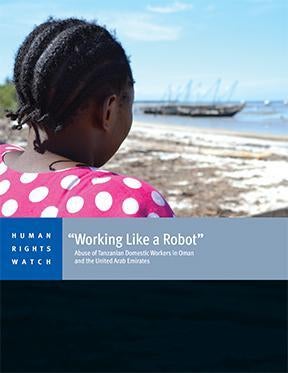“Working Like a Robot”
Abuse of Tanzanian Domestic Workers in Oman and the United Arab Emirates
This report documents how the Tanzanian, Omani, and UAE governments fail to protect Tanzanian migrant domestic workers. Oman and the UAE’s kafala – visa-sponsorship – rules tie workers to their employers, and the lack of labor law protections leaves workers exposed to a wide range of abuse. Gaps in Tanzania’s laws and policies on recruitment and migration leave Tanzanian women exposed at the outset to abuse and fail to provide adequate assistance for exploited workers.








